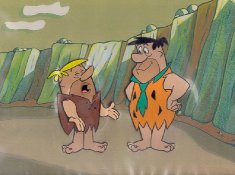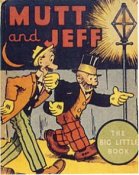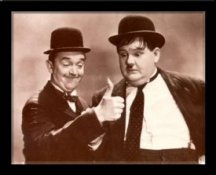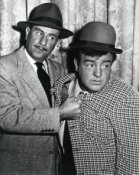Immortal Befuddled
"Dying is Easy, Comedy is Hard"
Edmund Keane, 1834
Part One: Double Trouble
by Dennis E. Power
The many faces of Ollu and Buzsla
Timeline
|
Bud and Lou are the king's musketeers who have to fight the evil duke. They are so inept at battle that the kingdom is reduced to a royal junkyard 1628 "Big Cannon Caper" Abbott and Costello Animated Series episode Abbott and Costello are swordsmen who are out to save the queen from the evil duke. Olla Buzla established
identities in Ollu was actually not very skilled at fencing, he knew the techniques, knew all the movements and knew all the proper strokes but he was more adept at analyzing someone else's movements than actually being accomplished in his own ability. As with almost all of their modern training, when Ollu and Buzsla felt threatened as in a real sword fight they panicked and reacted in a primitive manner, forgetting all of their training in blind fear and violent rage. Despite this however they were effective fighters when it came down the nitty gritty. They knew Athos, Aramis and Porthos but did not really associate with them, believing that they were troublemakers. In the twisted politics, constant intrigue of the court and the rivalry between the King, Queen, Cardinal and other factions working with the government and military, Ollu and Buzsla often did not understand the goals or motives of those giving them their orders. They merely followed them as best as they could. The evil Duke whom Ollu
and Buzsla were sent to guard the Queen against was the English Duke of
Buckingham, George Villiers who although married and a great favorite
of "James II" had conceived of a great passion for Anne of
Austria, the Queen of France. Buckinghham and Queen Anne had met when
Buckingham came to Anne was unhappy in her marriage and placed much of the blame on Richelieu because of his great influence over the King. Because Richelieu distrusted the Spanish and the English he considered the Queen suspect. The Spanish and the French were at odds with one another because of the Valtelline, which was a trade passage running from northern Milan, through the Alps and to Tyrol. The Huguenots religious sect used the distraction of the central government to consolidate their power, taking over the strategically important islands of Ré and Oléron. Both of these defended the sea entrance of La Rochelle and thus aided what was considered to be the Huguenots capital. In many ways the Huguenots had created an independent nation within the French Monarchy. Although the French military attempted to crush the Huguenot rebellion, the military was too spread out to effectively end this rebellion. So in February 1626 Richelieu signed the Treaty of La Rochelle. This was a truce inspired by the English. However, Richelieu viewed the involvement of the English with concern, as this was a Protestant nation seemingly supporting the Huguenots rebels, as Richelieu would have viewed them. The truce only gave the Huguenots more time to build up their strength. By 1627, they were in open revolt yet again – this time, openly aided by England. The English sent troops to help the Huguenots. They had this flexibility, as England was not physically involved in the Thirty Years War. There was public support in England for this as the French were still seen as England's traditional enemy. Such actions by the English made firm action by Richelieu imperative. In 1627, he directed a campaign against the Huguenots himself. Buckingham led 8000 men to the French port of La Rochelle to help the Huguenots who were under attack. The English, lead by the Duke of Buckingham, were driven off and out of the area. Richelieu decided to cut off La Rochelle and starve out the people. In 1628 Buckingham was in Portsmouth arranging for another expedition to La Rochelle when a naval lieutenant stabbed him to death. Ollu and Buzsla found themselves caught up in a bewildering morass of political and personal intrigue. The King plotted against his wife because he was jealous of her supposed love affair, because of her Spanish background and because she intrigued against Richelieu which Louis XIII saw as a direct opposition to the King's power. Yet publicly he supported her. The King also intrigued against Richelieu because he felt overshadowed by his Prime Minister in terms of power and intellect. He felt like less of a figurehead when outschemed the man behind throne. Anne of Austria intrigued against Richelieu because she thought he had too much power, because he accused her of disloyalty to the King. Although she did not intrigue against the King per se, she did attempt to out maneuver his intrigues against her. She also would not have been displeased to see her family, the Spanish monarchy gain more power and influence than her adopted country. Richelieu intrigued against the King and the Queen for the betterment of France. He thought the Queen was disloyal and the King rather ineffectual. Neither could truly be trusted to gain control of the government. He also of course wished to gain and maintain as much power as he could for both personal gain and for the benefit of the nation. At times he had to circumvent the wishes of the King or Queen to accomplish what needed to be done for France. Ollu and Buzsla became quite disenchanted with France when they began to puzzle out just how messy the intrigue truly was. The King's Musketeers working against the King to save the reputation of the Queen for the sake of France by aiding the Queen's supposed lover who was a supporter of rebels against the Monarchy. Disgusted by Richelieu's treatment of the ordinary citizens of La Rochelle, Buzsla and Ollu "died" during one the skirmishes. When the battle was over they made their way to the Netherlands |
.
Ollu and Buzsla had found sympathy with the Huguenots mainly from humanitarian reasons but also because they were interested in their religious beliefs. Tired of the corruption and immorality around them, they felt a need to purify themselves. In the Netherlands they found an English colony of Separatists. Posing as English mercenaries they joined this community. In a few years time they joined an emigration ship heading to the Massachusetts colony.
1638 "Drumsticks Along the Mohawk" Abbott and Costello Animated Series episode
Abbott and Costello are Pilgrims back in the 1600s. They've decided to celebrate their first year in the New World with a turkey dinner, to which they've invited Chief Leaping Lizard and his tribe. Costello is sent out to prepare the turkey, which, meanwhile has eaten some baking yeast and grown to the size of a two-story building. Costello makes many unsuccessful attempts to capture the bird, until the chief threatens to scalp the boys for having promised a nonexistent turkey dinner. At the last moment the giant turkey crashes into the cabin and scares away the Indians.
Despite its stereotypical depiction of native Americans as superstitious, violence prone savages and the exaggerated fantastic elements this episode does provide some information as to Ollu and Buzsla's life in the pilgrim colony.
Ollu and Buzsla were engaged in a couple of their older professions as a smith and as a baker. They also aided the colony in gathering food. Their relationship with the Native Americans is symbolic and typifies the Colonial experience. They were initially friendly to the Native Americans, sharing with them food and technology yet as the colony's population grew, as symbolized by the growing turkey (the nearly iconic symbol of the pilgrim experience), the native Americans were left with fewer resources and less land (the nonexistent dinner). Eventually the Indians were scared away or rather pushed out of their native lands. The Native Americans had received clear messages that the Colonists did not plan to leave. Nor did the Pilgrims regard the lives of the Native Americans as sacred.
In the Pequot war of 1637, a large force of Pilgrims and Native American allies attacked the Pequot village and wiped it out, killing or enslaving 500 to 1000 men, women and children. The war began as retribution for the murder of a trader. A murder purpotedly committed by persons of the Pequot tribe. Instead of applying diplomacy and English law to the incident the Pilgrims instead declared war, which gave them a justified reason to eliminate the Pequot. Some historians writing about this attack suspect that the Puritans were motivated more by the fact that the Pequots controlled valuable access to the sea and fishing, which would be the area leading to and around Mystic, Massachusetts. The English colonists had begun to consider the Native Americans as their subjects rather than their allies or neighbors. They convinced some of the leaders of the nearby tribes to sign treaties that legally restrained such tribes as the Wampanoag from trading with any other group. The treaty also prevented the tribes from selling any of its land without permission from the Plimouth colony.
As symbolized in the cartoon, the relationship between the Colonists and Native Americans deteriorated greatly by 1675 a full-fledged civil war took place in the colonies. King Philip's War was an extremely devastating war in terms of loss of life, privation, economic impact and social disruption. It caused severe economic hardship for the colonies and was, proportionately, the most costly war in terms of human life in American history. The only Native communities left in southern New England were those sachemships which had either stayed neutral and avoided conflict or assisted the colonists, or surviving Christian communities, many of which were on Cape Cod. The survivors were eventually put under the total jurisdiction of the colonies.
Having seen this disturbing pattern too often, Buzsla and Ollu wished to avoid witnessing the destruction of the Native American peoples and cultures. They had hoped, perhaps too optimistically, given earlier reports of the cooperative relationship that the Pilgrims and Native Americans that the outcome would be different. The rigid moral code of the Pilgrims did not stop them from behaving as violently or greedily as any other group. Buzsla and Ollu found the rigid social structure too confining as well. Since the Puritan's were no longer in power and since Charles II seemed to be making England a fun place to be again, Ollu and Buzsla returned to England.
They found employment as entertainers, acting in small roles in various productions of Behn, Congreve, Dryden, Wycherly and Shakespeare. They also acted as buffoons and entertained in noble and merchants homes. When the King died suddenly in 1685, his brother James II assumed the throne. This was not a problem with parliament except that James had more openly Roman Catholic leanings than his brother and all the male children from James marriage had died in childhood leaving only female children which had reached their maturity. However James had married again and the fear was that if he had a male child, that child would be raised Roman Catholic and inherit the throne.
James II had been forced to defend the throne against his brother's child, James Monmouth the Pretender who claimed that Charles had married his mother and so he, not James II should be King. Anti-Catholic Protestants supported Monmouth's claim.
The aftermath of the Monmouth rebellion was a veritable inquisition looking for those who had aided the rebel. The many executions turned popular favor away from James II.
In 1688 the Glorious Revolution took place in which James II was deposed by his daughter and her husband, who was also James' nephew. Mary was subservient to her husband and acceded to his will that they rule conjointly.
During the early troubles with Monmouth Buzsla and Ollu decided to become entertainers in Ireland believing that the Isle was free of turmoil at least for the foreseeable future. However after James II was deposed he marshaled his forces in Ireland. Irish, Scottish troops with the backing of French troops marched against but were defeated by William's forces at the battle of Boyne in 1690. James II lived out the remainder of his life in exile in France. Buzsla and Ollu were with the King's retreat from the battle of Boyne and accompanied him into exile in France.
Around 1695 they became tired of Europe and decided to return to the New World but needed to make their fortune first. They used their savings to buy a small trading ship and sailed around Africa towards India. Their plan was to load up on spices, sell them in France or England and use the profits to establish them in the New World. However their ship was stopped and searched by a ship of the East India Company. Ollu and Buzsla had not gone through the proper channels and their cargo of spices violated the monopoly granted to the East India Company. The East India Company seized the cargo and they were bereft of their fortune.
Timeline
© 2002 Dennis Power
Ashley, Chip The Dino-Boy FAQ.
Bramly, Sege. Leonardo: Discovering the Life of Leonardo Da Vinci, Harper Collins 1991
Brucker, Gene Renaissance Florence, Wiley and Son 1969
Burroughs, Edgar Rice The Outlaw of Torn, Ace 1978
Brown, Mark Prehistoric Survivors in the South Pacific
Burton, Richard Francis The City of the Saints and Across the Rocky Mountains to California
Cervantes, Miguel de "La Gitanella".
Clark, Jerome The Encyclopedia of Strange and Uexplained Phenonomena, Gale Research, 1999
Clebert, Jean-Paul The Gypsies, Penguin, 1963
Costain, Thomas The Three Edwards, Popular Library 1964
Cox, Stephen and Lofflin, John Abott and Costello Story, Cumberland House, 1997
David, Peter Being Human, Pocket Books 2001
Don Markstein's Toonpedia
Eckert, Win The Original Wold Newton Crossover Chronology
Farmer, Philip Jose Doc Savage: His Apocalyptic Life, Bantam 1973
Farmer, Philip Jose The Mad Goblin, Ace
Farmer, Philip Jose Tarzan Alive,
Farmer, Philip Jose Time's Last Gift
Island of Lost Souls, Universal Pictures, 1933.
Johnson, Charles Captain A General Historie of the robberies and murders of the most notorious Pirates,
Lai RickThe chronology of Shadows.
Manguel, Alberto and Guadlupi, Gianni The Dictionary of Imaginary Places, Harcourt Brace Jovanovich, 1987
Mandeville, John Adventures.
McClanahan, Michael D. The Story of Damon Runyon, 1999
McLoughlin, Dennis Wild and Wooly: An Encyclopedia of the Old West, Barnes and Noble 1995
Mitchell, Glenn, The Laurel and Hardy Encyclopedia, Batsford, 1995
More, Thomas, Utopia,
Okuda, Michael and Okuda, Denise, Star Trek Chronology, Pocket Books, 1996
Paul, Lee Henry Plummer: Man of Mystery
Phantom Empire, Mascot Pictures,
Rackham, John Beanstalk, Daw Books, 1973
Rabelais, Francois Five Books of the Lives, Heroic Deeds and Sayings of Gargantua and Pantagruel
Rogozinski, Jan Pirates: An A-Z Encyclopedia , Da Capo 1996
Rogozinski, Jan Honor Among Thieves: Captain Kidd, Henry Every and the Pirate Democracy in the Indian Ocean, Stackpole Books, 2000
Rovin, Jeff Return of the Wolfman,
Rovin, Jeff Encyclopedia of Monsters
Scarre, Chris Exploring Prehistoric Europe, Oxford University Press, 1998
Sherman, Steven Legendary Aviators and Aircraft of World War One, August 1999
Silva, Joseph Island of Dr. Moreau Ace, 1977 (film novelization)
Smmons, James The Hatfields and the McCoys
Time line of Romanai History
Thrilling Detective
Twain, Mark, Life on the Mississippi
United States Navy Official Site Battleships: The List, Updated: 18 April 2001
Waller, Altina L. The Hatfield and McCoy Feud
Wells, H. G. The Island of Dr. Moreau
Wolff, John U.S. relations with Brazil During World War Two
I



